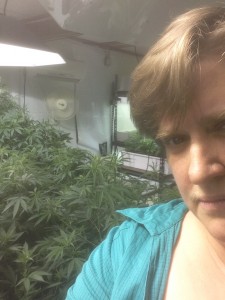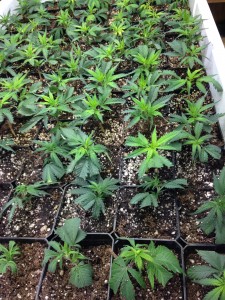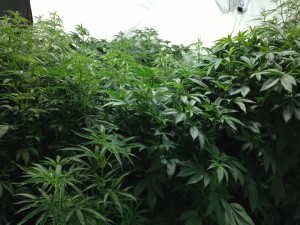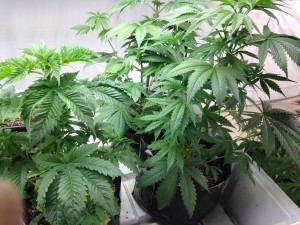Meet the grower: CannaMan Farms
It’s no big secret really, but just for the record, I was a pot smoker in high school.
I even inhaled.
Now that I’ve ruined any chance to run for office (note: not interested anyway) let me add that I never thought I’d be where I found myself Wednesday – standing in a room full of perfectly legal (at least in Washington state) marijuana plants at Clark County’s first approved and licensed grow facility, CannaMan Farms.

Watching this industry sprout from nothing is just plain fascinating. And because it’s brand new, the structure around it is an ongoing process and a bit of a mess.
But Brian Stroh, who owns the facility, said the state is doing a great job at transforming the rules into something new businesses can work with.
Shane Wahl, the head gardener, or the pot version of a craft brewmaster, said he recently asked the state to change one of its regulations to make it easier to comply, and they agreed.
Originally, growers were supposed to take dead leaves from each individual plant, weigh them and catalog them separately before destruction. He asked that the state allow growers to do that in bulk with the leaves, and they agreed.
“It’s going to save all the growers a lot of time,” Wahl said.
CannaMan Farms is like a small craft brewery. They’ll have a bunch of different plants, all hydroponically and organically grown, that create a variety of sensations for the recreational user.
And while they’re the first in Clark County, they almost certainly won’t be the only one. The state is cranking through grower and processor applications as it continues on the path to legal sales of the drug.
Some of the larger growers, call them the Henry Weinhard size growers as opposed to Heathen Brewing sized growers, haven’t yet been selected. But they will come, and soon.
And even with them, it will be hard for stores to stay stocked through the first year, many of those entering the industry have said.
“Oh, I imagine we’ll sell all our stock about five hours after the stores open,” Wahl said.
But they’re learning fast how to grow more product.
From cutting to full budded plant – for the fast growing strains – takes 10 weeks.
On Wednesday, perhaps six weeks in, Wahl was preparing about 900 cuttings for one of CannaMan’s initial sales batches.

Money is also a concern, Stroh said. Not the funding of the business, but dealing with any cash once he starts operations.
There’s nothing on the site except for plants that mostly aren’t even ready for harvest yet. But when he starts selling to retail operations, the cash he takes in won’t be accepted by an American bank. He’ll have to wire it overseas to keep it off his property, Stroh said.
He hopes that will change and banks become more comfortable with it as the industry finds its footing, and Stroh said he thinks that will happen in coming years.
“You just have to understand that we don’t have an infrastructure at all right now,” Stroh said. “There’s no banking, no postage delivery, transportation is a bit vague. We don’t have anything yet.”
But it will come. And he’s in almost constant contact with the state working on ways to streamline things, he said.
Looking at the plants close up, I was also fascinated by the variety of sizes and shapes of various plant strains. I understand that each provides a different experience, and I’m curious about how horticulturists have tweaked plants over the past few thousand years to meet various needs.
Pot didn’t become illegal in this country until 1937. Before that, it had a long history of use in folk medicine and religious practices around the world.
Some of these strains have been around for decades or centuries, but a lot of information about them has been hidden during pot prohibition.
I’m really looking forward to learning more about it. I’ll have more about CannaMan in The Columbian very soon.
If you’re curious about anything or want to talk about the issues, I’d love to hear from you.
Feel free to comment or email me at sue.vorenberg@columbian.com.
Cheers!
-Sue Vorenberg
Columbian Features Reporter


